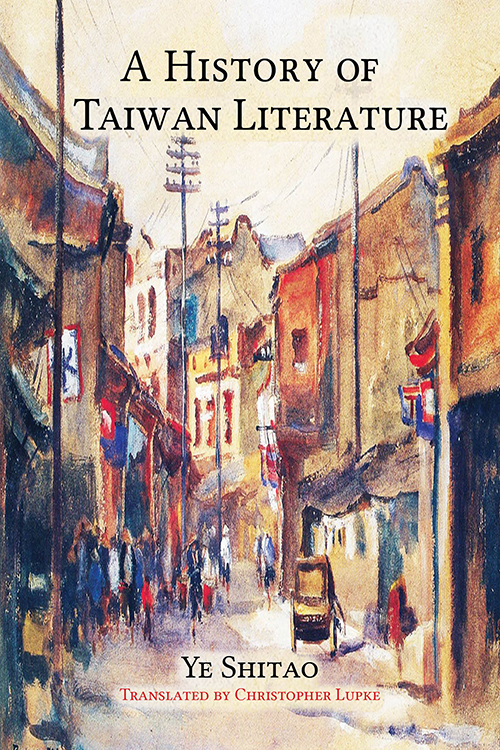A History of Taiwan Literature
A History of Taiwan Literature by Ye Shitao, an important public intellectual in Taiwan, was published in the crucial watershed year of 1987 when the end of martial law on the island was signaled. Ye’s work was clearly a product of that period and would have been less timid, considering the fact that the rule book on public expression had yet to be written, if it had been written later. The book is a rigorous, comprehensive treatment; it goes to great lengths to devote attention to all major writers in the history of Taiwan as well as many who were not as prominent. Ye has been fair and evenhanded in the writing of his literary history of Taiwan; there is little, if any, tendentiousness in the book. This is arguably one of the most important intellectual works of literary history, made even more impressive by Ye’s inclusion of copious notes, including Japanese-language ones.
In this translation, Christopher Lupke has painstakingly translated both Ye’s main text and notes, making this valuable resource available to English readers for the first time. Lupke also provides an introduction that contextualizes Ye’s work as well as an epilogue that outlines some of the major historical and literary developments after 1987, along with a brief mention of some of the most important literary figures of Taiwan. In addition to a glossary and index, Lupke offers a select bibliography that lists works that Ye referenced in his own notes as well as some books that Lupke consulted in completing this translation.
A History of Taiwan Literature is a most important resource for those interested in the intellectual history of East Asia, world literature, and Taiwan studies.
This book is part of the Literature from Taiwan Series, in collaboration with the National Museum of Taiwan Literature and National Taiwan Normal University.
================================================================================================
ABOUT THE AUTHOR
Ye Shitao (Yeh Shih-tao 葉石濤) is revered as a leader of the localist Taiwanese literary movement and an outspoken critic of martial law and the persecution of intellectuals. He engaged in the famous “nativist literature” debate of the 1970s and helped nurture the careers of countless authors of younger generations. In his history of Taiwan literature, however, Ye strives to adopt a fair and dispassionate tone toward all, ensuring that writers of all camps are represented in it. It is not the work of an academic but of someone immersed in the literary world of Taiwan who knows the milieu as well as anyone and better than most. Ye Shitao passed away in 2008.
ABOUT THE TRANSLATOR
Christopher Lupke is Professor and Chair of East Asian Studies at the University of Alberta. A specialist in modern Chinese culture, Lupke was trained in philosophy at Grinnell College, where he received his BA, in classical Chinese at the University of Wisconsin, Madison, where he received his MA, and in classical and modern Chinese as well as cultural theory and film at Cornell University, obtaining his PhD in 1993. In addition to being the author of the highly acclaimed The Sinophone Cinema of Hou Hsiao-hsien, Lupke has edited two books, The Magnitude of Ming: Command, Life and Fate in Chinese Culture (University of Hawai'i Press, 2005) and New Perspectives on Contemporary Chinese Poetry (Palgrave Macmillan, 2008), and edited or coedited four special theme issues of journals.
In this translation, Christopher Lupke has painstakingly translated both Ye’s main text and notes, making this valuable resource available to English readers for the first time. Lupke also provides an introduction that contextualizes Ye’s work as well as an epilogue that outlines some of the major historical and literary developments after 1987, along with a brief mention of some of the most important literary figures of Taiwan. In addition to a glossary and index, Lupke offers a select bibliography that lists works that Ye referenced in his own notes as well as some books that Lupke consulted in completing this translation.
A History of Taiwan Literature is a most important resource for those interested in the intellectual history of East Asia, world literature, and Taiwan studies.
This book is part of the Literature from Taiwan Series, in collaboration with the National Museum of Taiwan Literature and National Taiwan Normal University.
================================================================================================
ABOUT THE AUTHOR
Ye Shitao (Yeh Shih-tao 葉石濤) is revered as a leader of the localist Taiwanese literary movement and an outspoken critic of martial law and the persecution of intellectuals. He engaged in the famous “nativist literature” debate of the 1970s and helped nurture the careers of countless authors of younger generations. In his history of Taiwan literature, however, Ye strives to adopt a fair and dispassionate tone toward all, ensuring that writers of all camps are represented in it. It is not the work of an academic but of someone immersed in the literary world of Taiwan who knows the milieu as well as anyone and better than most. Ye Shitao passed away in 2008.
ABOUT THE TRANSLATOR
Christopher Lupke is Professor and Chair of East Asian Studies at the University of Alberta. A specialist in modern Chinese culture, Lupke was trained in philosophy at Grinnell College, where he received his BA, in classical Chinese at the University of Wisconsin, Madison, where he received his MA, and in classical and modern Chinese as well as cultural theory and film at Cornell University, obtaining his PhD in 1993. In addition to being the author of the highly acclaimed The Sinophone Cinema of Hou Hsiao-hsien, Lupke has edited two books, The Magnitude of Ming: Command, Life and Fate in Chinese Culture (University of Hawai'i Press, 2005) and New Perspectives on Contemporary Chinese Poetry (Palgrave Macmillan, 2008), and edited or coedited four special theme issues of journals.

Publisher
Cambria Press
ISBN
9781621964773
Published
2019
Specialisation
Humanities
Theme
Literature
Region
Taiwan